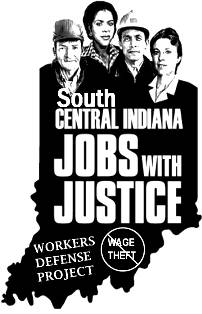With the holidays near, can calls to “shop local” be far behind? In October 2012, “Bloom Magazine” editor Malcolm Abrams made a persuasive case for the economic benefits of keeping dollars circulating locally (http://www.magbloom.com/?s=Shop+Right). But most calls to “shop local” have lacked an important caveat: some local businesses are shameless perpetrators of wage theft.
Wage theft happens when you aren't paid what you're owed for your work, contrary to labor law. Examples include:
• Not getting paid for overtime
• Not getting paid minimum wage (whether or not you're a U.S. citizen)
• Not getting your final paycheck after leaving or losing your job
• Not getting paid for work during a “probationary” period
• Not getting paid for work that should be “on the clock” (e.g. preparing your work space)
• Being told you’re a self-employed worker or an independent contractor, when you actually meet the legal definition of an employee (and so should receive overtime pay, family medical leave, workplace safety and nondiscrimination protections, worker compensation insurance for work-related injuries and at least minimum wage).
If human solidarity, civic pride and a love of justice aren’t adequate incentives, there are economic reasons why shoppers should not patronize local businesses that practice wage theft. Wage thieves have lower labor costs, thus putting honest employers at a competitive disadvantage. Wage thieves make us pay their share of taxes for worker compensation, unemployment insurance and Social Security. And workers cheated out of worker compensation are obliged to rely on social services the rest of us end up paying for.
South Central Indiana Jobs with Justice and other local nonprofits and government entities have fielded—and dealt with—numerous complaints of wage theft over the years, several involving local businesses. The Bloomington Human Rights Commission’s “Fair Labor Initiative," focused on restaurants, exemplifies one laudable, proactive step toward addressing the problem (http://bloomington.in.gov/documents/viewDocument.php?document_id=8759).
Can we integrate our efforts? Bloomington's new mayor might consider the example of Lioneld Jordan, the mayor of Fayetteville, Arkansas, who set up a Task Force on Wage Theft in 2010, which—among other things—created a hotline to report wage theft cases. A Bloomington task force, I’d suggest, should work with campus and off-campus groups that have shouldered the burden of addressing complaints heretofore. It should bend over backwards to build the trust of vulnerable, undocumented immigrants. And it should think creatively about how to educate the public, expand access to legal representation, and lobby for improved state and local enforcement of labor law.
Indiana University and the Greater Bloomington Chamber of Commerce should feel an interest, if not an obligation, to join forces with others on this issue. At a minimum, wage theft should become part of IU’s required “financial literacy” curriculum, and the Franklin Initiative should help make sure wage theft is a topic that’s covered in high school.
Meanwhile, shoppers unsure about a merchant’s labor practices should simply ask him/her or his/her workers. If you do the latter, make sure it’s in a context that isn't likely to jeopardize the workers’ employment.
“Shop local,” by all means--when it’s ethical to do so. But let's try to “shop right,” in any case.
